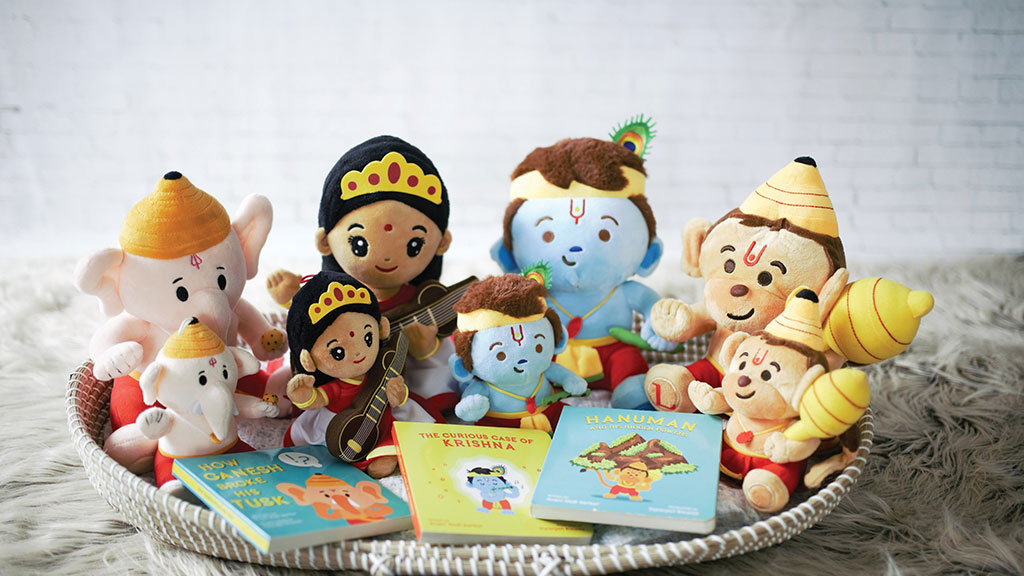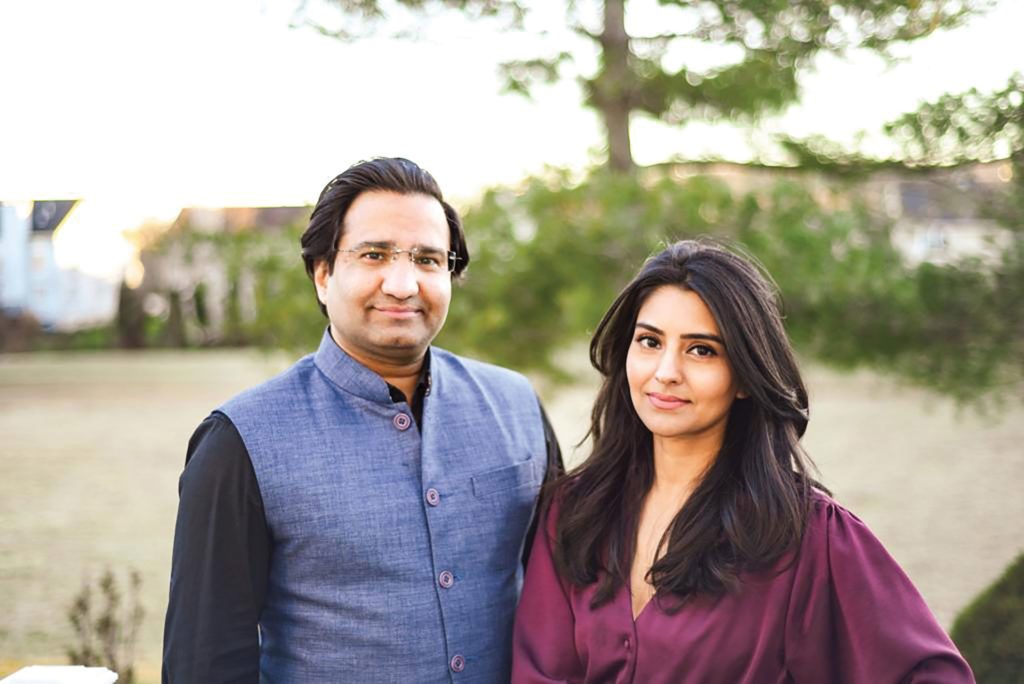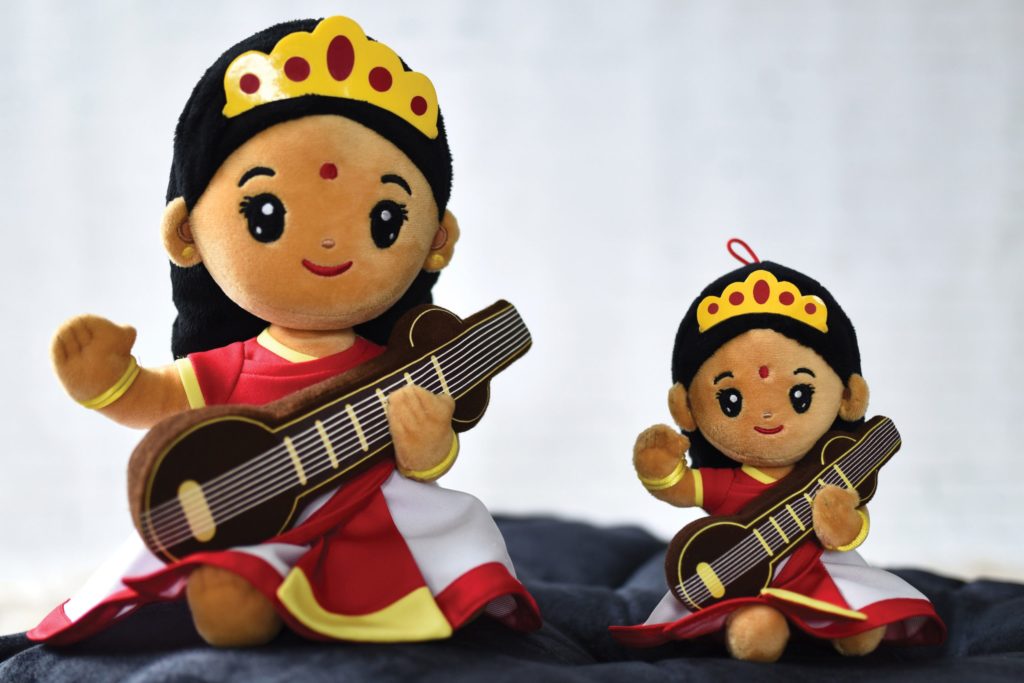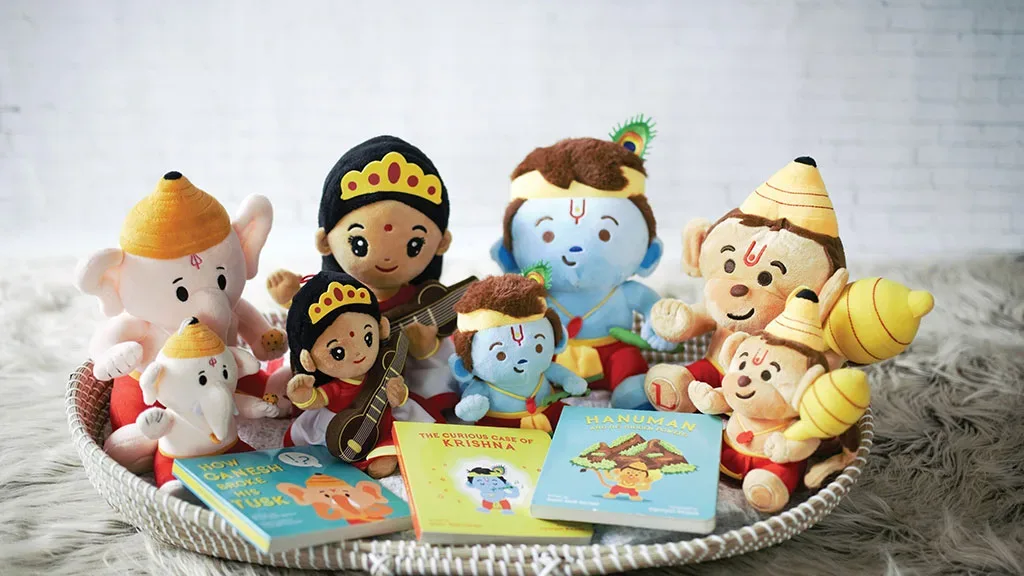
Growing up in the U.S., Modi Toys Co-Founders Avani Modi Sarkar and her brother Viral always felt connected to their South Asian roots and their Hindu heritage. It wasn’t until they both became parents that they realized something was missing: There were no resources to cultivate that same link to Hinduism for their kids. A quick search down the toy aisle proved that the U.S. toy market was severely lacking in representation. Although the global toy market was growing, there were not any toys that reflected diversity in faith.
Sarkar and her brother are immigrants from India, but their kids are first-generation Americans. The two parents began to encounter an increasingly more common problem: Toy companies simply weren’t catering to America’s diverse melting pot. According to the Pew Research Center, the Indian American population grew 142% between 2000 and 2019, but young South Asian kids still weren’t seeing themselves reflected in the toy aisles. With each new generation in the U.S., Sarkar and her brother knew that the link to Hinduism and their home country would weaken. “When we couldn’t find a solution, we created our own,” Sarkar says.

That solution? Modi Toys, a toy company that primarily makes singing plush Hindu deities — for now. Their current lineup includes Baby Ganesh, Baby Krishna, Baby Hanuman, and Saraswati Devi, the company’s first female deity. Each plush deity carries an accessory that is part of its story and sings a mantra when kids press its button. Parents can also opt to add a Bluetooth speaker to the toy in order to play a custom sound. Sarkar explains that in Hindu culture, mantras are similar to nursery rhymes: “When [our kids] were born, [Viral and I] would regularly hear our mom singing mantras to her grandkids, in lieu of singing American nursery rhymes like ‘Twinkle Twinkle Little Star.’ Moments like these were the catalyst for creating a singing toy — and in a way, capturing the essence of our mom.”
FINDING INSPIRATION IN HERITAGE
Although Hinduism is considered the world’s oldest religion with about 1 billion followers, American consumers may not know the meaning behind Modi Toys’ choice of deities. Sarkar clears up the confusion by drawing a parallel to Greek mythology. Similar to how Greek gods are paired with certain attributes, each god and goddess in Hinduism represents a certain trait or quality.
For example, Ganesh is the god of luck; Hanuman is the god of strength; Krishna is the god of love; and Saraswati is the goddess of knowledge, music, and the arts — all deities that Sarkar and her brother chose for their plush toys. Additionally, each deity is associated with a specific mantra — an ancient Sanskrit prayer — that can be sung while people meditate or pray. Although they can be recited on special holidays, “these mantras are a daily part of life for many Hindus,” Sarkar says.
Since launching their company in 2018, Sarkar and her brother have sold more than 40,000 products across 49 states and 27 countries. Despite being initially pigeonholed as a niche Hindu toy, Modi Toys has recently started seeing mainstream recognition and coverage of its products. Year after year, the company has seen growth across all sales channels, including major retailers, like Amazon, and independent retailers, such as temple gift stores. To Sarkar, “This is an indication of us solving a real need and a real problem that had not been met by the larger, more established toy brands.”
In particular, the brand has resonated with Hindu families searching for a toy that reflects their culture, as well as non-Hindu families who have discovered a new toy that inspires their kids. The company has a devoted fan base, evidenced by happy customers flocking to the brand’s Instagram page with rave reviews. However, Modi Toys’ social media success wasn’t accomplished in a day: Growing the company’s Instagram community was challenging, but Sarkar’s hard work paid off.
“I look at our community as an extension of our brand,” Sarkar explains. “It’s a way to spark curiosity about our Hindu faith and provide simple ways to connect with it.”
Although Modi Toys’ fan base originated with Hindu families seeking representation, these mantra-singing plush deities are finally making a mark in the toy industry. It’s important now more than ever for kids to see and to play with toys that reflect the world around them.

Sarkar and her brother are seeing that retailers are excited to diversify their toy shelves. “We’re finding there’s a real appetite for increasing representation on the shelves,” Sarkar says. She explains that diversification in the toy industry is important for the end user: kids. According to her, although there isn’t much research on the benefits of toys that relate to religious diversity, exposing young kids to diverse toys can help shape their self-esteem when they see themselves represented. However, diverse toys aren’t just beneficial for the ones they’re representing. For kids who don’t identify with Hindu culture, having an assortment of toys to play with familiarizes them with our complex and multicultural world.
WHAT’S NEXT?
Increasing kids’ familiarity with the changing world around them is exactly why Sarkar and her brother created Modi Toys. Sarkar reveals that they “designed [their] products as part of a broader movement to make playrooms more inclusive, and to celebrate individuality and ‘otherness.’” This sentiment doesn’t stop at just plush toys — Modi Toys has already expanded into wall prints, clothing, and board books that tell kid-friendly stories from Hindu mythology.
Expanding the company is the first task on the co-founders’ minds. This spring, Modi Toys released its first Shhhanti Musical Crib Mobile, which introduces instrumental mantras to babies in their cribs and on the go. The brand is also releasing a goddess plush collection that is accompanied by a new book called Desi Devis: South Asian Women of Wonder from A to Z. The book features 26 inspirational women from the past and present in the South Asian community and intends to help girls feel more represented by seeing women of color at an early age. The toy company is also growing globally. This year, Modi Toys is headed to one of the fastest-growing toy markets in the world: India.
With so much growth on the horizon, the company has no plans to slow down.
“The tide seems to be shifting in the toy industry,” Sarkar says. “The fact that we’ve been recognized for our work in diversifying the playroom … is a testament to the fact that there is an appetite for more inclusive, diverse toys for all kids.” Diverse representation in the playroom matters. Educating kids about the world around them is important as they develop their own thoughts and feelings.
And there’s no better way to start reflecting the modi[ern] world than with Modi Toys.
This article was originally published in the May 2022 edition of the Toy Book. Click here to read the full issue!

